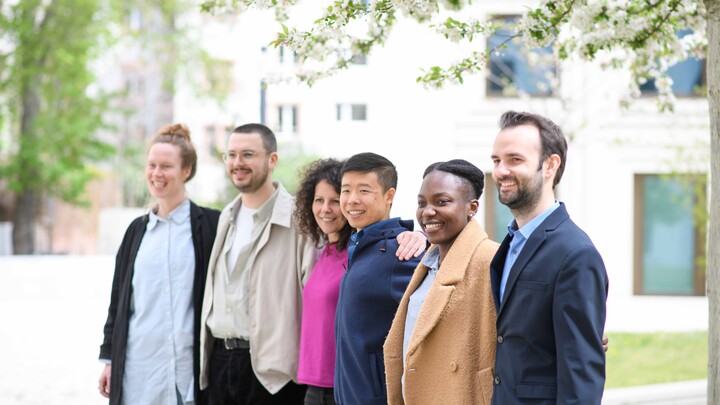Gender equality and diversity

The MCCR shares the values of the University of Mannheim regarding social diversity and equal opportunities. Social diversity and equal opportunities are seen as prerequisites for a modern, forward-looking, internationally active and dynamic university, where excellent scientific research and education take place.
In close collaboration with the Department of Equal Opportunity and Social Diversity, the MCCR will complement already existing university-wide measures and will provide a research environment in which gender and diversity awareness is important and which attracts applications of highly qualified women at the doctoral and postdoctoral level. The expertise of Jutta Mata (B01, B03) who is a member of the steering committee of the MCCR and served as the university’s equal opportunities officer will further help create a research environment that promotes gender equality and diversity awareness, gender-diversity communication and gender-diversity-sensitive organizational culture.
These complementary measures shall help achieve the goals of providing a family-friendly workplace for its members, obtaining gender equality among its researchers and supporting their career advancement in line with the DFG’s Research-Oriented Standards on Gender Equality.
The MCCR will establish the following measures:
Career advancement measures by the MCCR
Continuous digital gender monitoring
The MCCR will set up a continuous digital gender monitoring to evaluate the proportion of men and women represented at every level of the MCCR. One important advantage of a continuous digital monitoring is that it will be always at hand and not – as is common practice to date – once a year or every two years. Therefore, if women are underrepresented at a specific level or in a specific research area, this can be immediately communicated, and action can be taken. Further, evaluating such a monitoring after the different funding periods will allow to identify barriers to promoting gender equality and, more importantly, evaluate which practices aimed at promoting women in science were more fruitful than others and thus focus on the most successful practices in future funding periods.
information sessions for female students
The MCCR will establish information sessions for female students on the master’s level about doing a doctorate at the MCCR. These sessions will serve to inform female students about science as a profession and the opportunities to work in science in general and as a doctoral researcher at the MCCR in particular. Female students will have the opportunity to get to know scientists of the MCCR, meet potential role models, and establish a network of people to consult in the application phase. Ideally, this will result in mentoring relationships with MCCR researchers.
The information sessions will be beneficial for the MCCR because they offer an opportunity to get to know potentially interesting future doctoral researchers. Moreover, these sessions can help create a culture that values diversity, for example by raising awareness that the proportion of female doctoral researchers in general is lower than that of female students at the master’s level and, ultimately, increase the number of female doctoral researchers at the MCCR.
Brochure with diverse courses and workshops
All female MCCR researchers receive a brochurewith diverse courses and workshops on different topics that focus on soft skills and the advancement of their career (e.g. leadership, self-presentation and research communication, project management and conflict management, academic writing in English, job application/
appointment procedure training). This brochure will be compiled on a yearly basis by the MCCR management in coordination with the Department of Gender Equality and Social Diversity. In addition, the MCCR management will contact female researchers with recommendations and concrete proposals for such courses on an individual, personalized level. In the past, this strategy was embraced by female researchers, resulting in high attendance of seminars by researchers of different groups: doctoral candidates, postdoctoral researchers, and junior professors. Female Faculty Meeting
Female researchers are more likely to be in a minority position as they reach higher career levels. At the same time, establishing networks is important for further career achievements. To encourage female researchers to connect and share their experiences and strategies, a ‘Female Faculty Meeting’ of female researchers in the MCCR will be established and career events with senior professors will be offered. Another option is holding all-female research events where female researchers can present papers and discuss strategies on how to further strengthen female researchers with structural and individual measures. The atmosphere and style of debate of such events in the past was perceived as very constructive and empowering.
University- and state-wide training programs
The MCCR encourages female researchers to participate in university- and state-wide training programs, fees will be covered by the MCCR. Available trainings include the “Mentoring und Training” Program, which is organized by gender equality officers in the state of Baden-Württemberg (“LaKoG”). Further, there are the university-wide WOVEN programs which support female researchers at different stages of their career. These programs include career-planning, coaching workshops, special training for facilitating a scientific career and supporting vivid networking among female doctoral researchers, postdocs, and senior staff. Past individual feedback from female researchers was that both training programs and being able to address and discuss gender equality but also personal issues with a gender aspect led to a feeling of being supported.
Family-friendly measures by the MCCR
Parent-child office
In collaboration with the Department of Equal Opportunity and Social Diversity, the MCCR will offer its own parent-child office which is supposed to be appealing to both toddlers and adolescents – and of course to their parents. While their children can play, learn or sleep in this office, parents can work on their research.
Child-care services during conferences
We will offer child-care services during conferences, not only to members of the MCCR but also to guest researchers who need to take their children with them to the conference
Brochure for parents and parents-to-be
A brochurefor parents and parents-to-be (in English and German) with information on maternity/
paternity leave, parent’s money (Elterngeld), work contract regulations, home office, MCCR specific offers, etc. With this brochure, MCCR members have all relevant information in one place and do not need to search through different sources.
Central measures by the University of Mannheim
Members of the MCCR benefit from the diverse measures by the University of Mannheim that have been established to foster equal opportunities and diversity. Over the last decade, the university has heavily invested in fostering equal opportunities on every structural level and all career stages. Gender equality and diversity are strategic goals deeply rooted in the university’s mission statement as well as its culture and has been institutionalized by the foundation of the Department of Equal Opportunity and Social Diversity in 2011, which reports directly to the Vice President for Strategic Planning, Internationalization and Equal Opportunity and the university’s executive board.
Department of Equal Opportunity and Social Diversity
The Department of Equal Opportunity and Social Diversity is incorporated into every structural level of the university and acts as a central coordinator for gender-equality efforts which include implementing measures of gender diversity in faculties and disciplines in which women are still underrepresented. The department offers a set of programs and services to promote and to facilitate female research careers as well as to support early career researchers in balancing the demands between family and their professional life. This includes a service center providing advice and support regarding social issues and planning scientific careers. Several programs for female researchers have been initiated which include mentoring, professional qualification and family-friendly measures:
